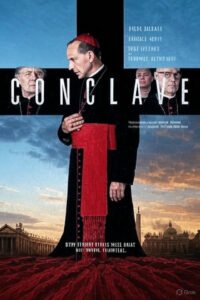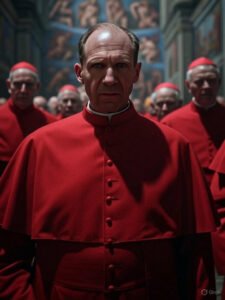Conclave (2024): A Papal Thriller Where Shadows Whisper and Secrets Explode

Prologue: The Vatican’s Heartbeat Quickens
In the hallowed halls of the Vatican, where the air smells of incense and ambition, a Pope has died. The world holds its breath, but inside the Sistine Chapel, the real drama begins. Conclave (2024), directed by Roland Joffé, is no dry procedural about men in funny hats picking a spiritual leader. Oh no. It’s a labyrinth of suspense, a sacred game of thrones where every cardinal is a player, every vote a gamble, and every secret a ticking bomb. Based on Robert Harris’s novel, this film takes the ancient ritual of the papal conclave and transforms it into a thriller so taut you’ll forget to blink.
Picture this: a room sealed tighter than a pharaoh’s tomb, where cardinals in crimson robes gather under Michelangelo’s judgmental frescoes. Their mission? To choose the next Vicar of Christ. But as the ballots burn and the smoke rises, so do the stakes—higher than a cathedral spire. This is a story of faith tested by human frailty, of power cloaked in piety, and of secrets that could shake the very foundations of the Church.
With a cast that could make a Vatican cafeteria menu sound like Shakespeare and a director who knows how to turn a whisper into a scream, Conclave is a cinematic confession you won’t soon forget. Ready to step into the shadows? Let’s unravel this divine mystery.
Act I: The Stage is Set, and the Stakes are Eternal
The film opens with a death—a Pope, progressive yet enigmatic, has shuffled off this mortal coil, leaving the Catholic Church teetering on the edge of a new era. Enter Cardinal Thomas Lawrence (Ralph Fiennes), a man who looks like he’s been carrying the weight of original sin since breakfast. As Dean of the College of Cardinals, Lawrence is the reluctant shepherd of this conclave, tasked with corralling a flock of ambitious clerics into choosing a new Pope. But don’t be fooled by his quiet demeanor; beneath those soulful eyes lies a man who knows the Vatican’s secrets could fill a library bigge

r than Alexandria’s.
The players in this sacred drama are a rogue’s gallery of holy men. There’s Cardinal Bellini (Stanley Tucci), a liberal who’d rather debate Dawkins than don a mitre, his wit as sharp as a papal encyclical. Cardinal Tedesco (Sergio Castellitto) is the conservative firebrand, a man who dreams of a Church that looks more like 1324 than 2024.
Cardinal Tremblay (John Lithgow) slinks through the halls with a smile that could charm a snake, but his eyes betray a hunger for the papal throne. And then there’s Cardinal Benitez (Carlos Diehz), a latecomer whose mysterious arrival feels like a plot twist dropped by divine intervention. Oh, and let’s not forget Sister Agnes (Isabella Rossellini), a nun whose quiet presence is like a storm brewing on the horizon.
The plot moves like a chess game played in a thunderstorm. Each round of voting is a battle, with alliances forming and fracturing faster than you can say “Habemus Papam.” But the real suspense lies in what’s not said—the glances, the whispers, the secrets that bubble up like lava beneath St. Peter’s Square. And when a bomb explodes in Rome—yes, a literal bomb—the stakes skyrocket. Is it a random act, or is someone pulling strings from the shadows? The film keeps you guessing, each revelation tightening the noose around your curiosity.
Act II: Performances That Could Convert an Atheist
Ralph Fiennes as Cardinal Lawrence is the beating heart of Conclave, and oh, what a heart it is—bruised, burdened, but unyielding. Fiennes plays Lawrence like a man walking a tightrope over a pit of vipers. Every furrow of his brow, every hesitant pause, feels like a prayer for sanity in a world gone mad. He’s the audience’s guide through this ecclesiastical maze, a man torn between faith and doubt, duty and despair. Yet, Fiennes injects just enough dry humor to make Lawrence feel like your favorite uncle—the one who’d sneak you a glass of wine at a funeral and whisper, “This place is a circus.”
Stanley Tucci’s Cardinal Bellini is a revelation, a man who wears his cynicism like a well-tailored cassock. Tucci’s performance is a masterclass in understated rebellion; every eye-roll and sarcastic quip feels like a middle finger to Vatican bureaucracy. His scenes with Fiennes are electric, like watching two old friends argue over the meaning of life in a smoke-filled bar. Bellini’s struggle—wanting to reform the Church but dreading its politics—is so relatable you’ll want to buy him a espresso and say, “Same, buddy.”
John Lithgow’s Cardina

l Tremblay is the villain you love to hate, a man whose charm is as slick as holy oil. Lithgow leans into the role with a predatory grace, his smile promising salvation while his eyes plot domination. He’s the cardinal you’d suspect of rigging the conclave, and Lithgow makes every moment deliciously sinister. Sergio Castellitto’s Cardinal Tedesco, meanwhile, is a tornado in a red robe, all bluster and brimstone. Castellitto plays him like a man who’d burn heretics at the stake if given half a chance, yet there’s a flicker of vulnerability that keeps him human.
Isabella Rossellini’s Sister Agnes is the film’s secret weapon. With minimal screen time, she commands every scene like a queen in a chess endgame. Her eyes—sharp, knowing, and just a little terrifying—hint at secrets that could unravel the entire conclave. And Carlos Diehz’s Cardinal Benitez? He’s the wildcard, a quiet enigma whose every word feels like a clue to a puzzle you didn’t know you were solving. The ensemble is a symphony, each note distinct yet part of a glorious, chaotic whole.
Act III: The Craft of Suspense—Joffé’s Vatican Conspiracy
Roland Joffé directs Conclave like a maestro conducting a requiem in a haunted cathedral. The Vatican is a character in itself, its gilded halls and shadowy corridors captured by Stéphane Fontaine’s cinematography with a painterly intensity. Every frame is a Renaissance masterpiece, but one where the angels are plotting and the saints are sweating. The Sistine Chapel, with its frescoes looming like divine CCTV, feels both majestic and oppressive, a perfect metaphor for the conclave’s stakes.
Volker Bertelmann’s score is a pulse-pounding hymn, blending choral chants with strings that hum like a heartbeat under pressure. It’s the kind of music that makes you feel like you’re one vote away from Armageddon. The sound design is equally masterful—every rustle of a robe, every echo of a footstep, feels like a warning. Kate Dowd’s editing is razor-sharp, cutting between hushed confessions and explosive revelations with the precision of a papal decree.
Joffé knows how to build suspense, turning every vote into a cliffhanger. Will Bellini’s coalition hold? Is Tedesco’s outburst a tantrum or a tactic? And what’s with that bomb in Rome—random chaos or a calculated strike? The film’s pacing is a tightrope walk, though it occasionally lingers too long on dramatic stares (yes, Ralph, we know you’re conflicted). But these are minor sins in a film that feels like a conspiracy unfolding in real time.
Act IV: Themes That Haunt Like a Ghost in the Vatican
Conclave is a meditation on faith, but it’s not here to preach. It asks questions that linger like incense smoke: Can divine will survive human ambition? Is the Church a beacon of hope or a gilded cage? The film doesn’t judge; it observes, letting the cardinals’ flaws and virtues clash like titans. Lawrence’s quiet faith is tested by the political circus around him, while Bellini’s skepticism feels like a cry for a Church that practices what it preaches. Tedesco’s conservatism is both a warning and a tragedy, a man clinging to a past that never really existed.
The film’s exploration of power is positively Machiavellian. The conclave is a microcosm of politics—alliances shift, secrets are weapons, and trust is a luxury no one can afford. Yet, Conclave humanizes its players with moments of humor that cut through the tension like a ray of light through stained glass. There’s a scene where a cardinal grumbles about the Vatican’s coffee, and it’s so perfectly petty you’ll laugh out loud. These glimpses of humanity—doubt, pride, even hunger—make the film’s high stakes feel achingly real.
The external world creeps in like an uninvited guest, with protests and that mysterious bomb adding a layer of dread. Is the Church under siege, or is it its own worst enemy? The film doesn’t answer, but it leaves you pondering long after the credits roll. And then there’s the final twist—a revelation so bold it’s either a stroke of genius or a leap into telenovela territory. I won’t spoil it, but let’s just say it’s the kind of plot point that makes you gasp, laugh, and immediately want to rewatch the film.
Act V: The Sins of Conclave
Even a film as divine as Conclave has its mortal flaws. The pacing falters in the second act, lingering on dramatic pauses like a cardinal savoring his moment in the spotlight. Some twists push the boundaries of plausibility, teetering on the edge of Dan Brown-esque excess. That bomb in Rome? It’s a thrilling jolt, but it feels like a plot device borrowed from a lesser thriller. And while Sister Agnes is a force of nature, her limited role feels like a missed opportunity to explore the Church’s gender dynamics.
These flaws, though, are like smudges on a stained-glass window—they don’t diminish the beauty. Conclave embraces its excesses, turning potential weaknesses into part of its charm. It’s a film that knows it’s a little ridiculous and leans into it, like a cardinal winking at you during a sermon.
Epilogue: A Thriller Worthy of the Papal Throne
Conclave is a cinematic miracle—a thriller that grips you like a vice, a character study that breaks your heart, and a comedy that sneaks up on you like a rogue nun. It’s a film that respects the sanctity of its setting while reveling in its human absurdity. Ralph Fiennes and his fellow cardinals deliver performances that could convert the staunchest skeptic, while Joffé’s direction weaves a tapestry of suspense that’s as gorgeous as it is gripping.
Is it perfect? No, but perfection is boring. Conclave is a wild, holy ride that leaves you questioning faith, power, and the secrets we keep from ourselves. It’s Survivor: Sistine Chapel, House of Cards with a halo, and a love letter to the messiness of humanity. So, light a candle, say a prayer, and dive into this Vatican conspiracy. You won’t emerge unscathed, but you’ll be glad you took the leap.
Cast
credit – https://en.wikipedia.org/wiki/Conclave_(film)#Cast
- Ralph Fiennes as Cardinal Thomas Lawrence, a British liberal and the Dean of the College of Cardinals.
- Stanley Tucci as Cardinal Aldo Bellini, an American progressive reformer and the late pope’s Secretary of State. Bellini’s failure to gain election, despite being the early favorite, is based on Carlo Maria Martini‘s experiences during the 2005 papal conclave[7]
- John Lithgow as Cardinal Joseph Tremblay, a Canadian moderate
- Lucian Msamati as Cardinal Joshua Adeyemi, a Nigerian with conservative social views
- Brían F. O’Byrne as Monsignor Raymond O’Malley, the Secretary of the College of Cardinals who acts as Lawrence’s assistant and researcher
- Carlos Diehz as Cardinal Vincent Benitez, a little-known Mexican archbishop working in Afghanistan
- Merab Ninidze as Cardinal Sabbadin
- Thomas Loibl as Archbishop Mandorff
- Sergio Castellitto as Cardinal Goffredo Tedesco, an Italian traditionalist
- Isabella Rossellini as Sister Agnes, the cardinals’ housekeeper and head caterer
- Jacek Koman as Archbishop Janusz Woźniak, the Prefect of the Papal Household and the late pope’s confidant
- Loris Loddi as Cardinal Villanueva
- Roberto Citran as Cardinal Lombardi
- Balkissa Maiga as Sister Shanumi
The Plot In another way
After the pope dies of a heart attack, the College of Cardinals, under the leadership of its dean, Thomas Lawrence of the United Kingdom, convenes to elect a successor. Aldo Bellini, a progressive reformer from the United States, Joshua Adeyemi, a social conservative from Nigeria, Joseph Tremblay, a moderate from Canada, and Goffredo Tedesco, a staunch traditionalist from Italy, all emerge as potential candidates.
Archbishop Janusz Woźniak, the prefect of the papal household, tells Lawrence that the pope demanded Tremblay’s resignation before dying, which Tremblay denies. Bellini, meanwhile, tells his supporters that his goal is to prevent Tedesco from winning the papacy. Lawrence is surprised by the last-minute arrival of Mexican-born Archbishop Vincent Benítez of Kabul, whom the pope named cardinal in pectore the previous year.
 Some interpret Lawrence’s impromptu homily, which encourages the college to embrace uncertainty and serves as an open declaration of his papal ambition, as the opening act of the deliberations. No one obtains the two-thirds majority necessary to win, though Adeyemi commands a lead over Tedesco and Tremblay while Bellini and Lawrence split the progressive vote. Monsignor Raymond O’Malley, Lawrence’s assistant, discovers the pope paid for Benítez to be flown to Geneva for a medical appointment that Benítez later canceled.
Some interpret Lawrence’s impromptu homily, which encourages the college to embrace uncertainty and serves as an open declaration of his papal ambition, as the opening act of the deliberations. No one obtains the two-thirds majority necessary to win, though Adeyemi commands a lead over Tedesco and Tremblay while Bellini and Lawrence split the progressive vote. Monsignor Raymond O’Malley, Lawrence’s assistant, discovers the pope paid for Benítez to be flown to Geneva for a medical appointment that Benítez later canceled.
On the second day, the college witnesses an altercation between Adeyemi and Sister Shanumi, a Nigerian nun recently transferred to Vatican City. Lawrence talks to Shanumi, who says that she had an illicit relationship in the past that resulted in the birth of a son. Adeyemi confirms the story when pressed.
Though Lawrence is bound to secrecy, a whisper campaign derails Adeyemi’s candidacy. Bellini makes the reluctant choice to support Tremblay. Working with Sister Agnes, the nun acting as head caterer and housekeeper, Lawrence discovers that Tremblay arranged for Shanumi’s transfer.
Tremblay says he did it because the pope asked him to. After that, Lawrence breaks into the sealed apartment of the pope and discovers documents indicating that Tremblay paid cardinals to vote. He shows the documents to Bellini, whose plea not to reveal their existence sparks an argument.
On the third day, Lawrence and Agnes publicize Tremblay’s actions, effectively removing Tremblay from contention. Lawrence then reconciles with Bellini and agrees to stand against Tedesco. He votes for himself during the deliberations, but before he can cast his vote, he is blown off his feet by an explosion that damages the Sistine Chapel.
The college learns the explosion was one of a series of suicide bombings currently occurring throughout Europe. While Tedesco demands a religious war against Islam, Benítez argues against meeting violence with violence and chastises everyone for prioritizing their political agendas over their shared religious mission.
Voting resumes, and as light shines through a broken window, the college overwhelmingly elects Benítez, who chooses the papal name of “Innocent”. Lawrence is initially enthusiastic until O’Malley pulls him aside to discuss Benítez’s canceled medical appointment.
When confronted by Lawrence, Benítez reveals he was born with a uterus and ovaries but was unaware of their existence until an appendectomy revealed them. The appointment was for a laparoscopic hysterectomy that he decided against, believing he should remain as God made him.
Lawrence wanders the Vatican grounds, listening to the crowds cheer Pope Innocent’s election, before returning to his room, opening the window and observing a trio of young nuns chattering in the courtyard below.
